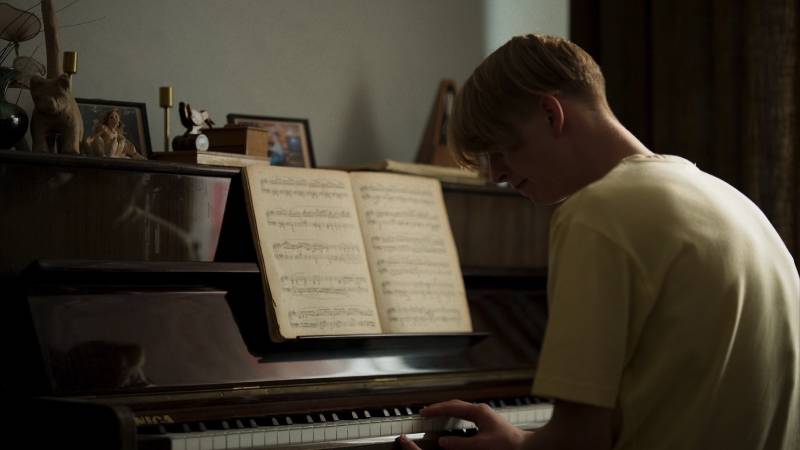




































Throughout Bread and Salt, the debut feature film from Damian Kocur, based on real-life events, economy is the driving force. Whether it’s the literal economic conditions which have pushed working-class students Tymoteusz and Jacek (played by the real-life Bies brothers) to become piano virtuosos or those of the camera, this sparse film told in vignettes plays with what we the viewer can withstand and understand.
The story is somewhat bare. Tymoteusz has come back to the suburbs from a conservatory apprenticeship in Warsaw to spend the summer with Jacek in their childhood home and estate. The more determined of the two (throughout the summer his suitcase remains unpacked), he is predominantly nearest to the camera and in focus. Quickly, we see the story through his eyes. Jacek, out of focus and fading away as his aspirations leave him, has abandoned his piano lessons to hangout with his girlfriend and friends from the estate. Their time is spent in circular conversations, drinking, smoking spliffs, freestyle rapping and frequenting a local Arab-run kebab shop where they butt heads with the owners. It is the scenes in the kebab shop where the tension comes and builds, uncomfortably, towards a conclusion we can all to grimly predict.
What separates the story from bordering on statistical drudgery of violence committed amongst youth in the suburbs is the performances (from the non-professional actors) and the cinematography. Bread and Salt is, despite the subject matter and increasing tension, a beautifully shot and edited film. It is here where economy really makes its mark.

There are more shots within the first two minutes of a Michael Bay movie than in this entire film. At times it feels as if the camera is being run by a corpse. The economy with the camera movements is so tight that a slow zoom into Tymoteusz’s face feels as exciting as the chariot race in Ben-Hur (William Wyler, 1959). Whenever the camera does move it is usually behind our protagonists, grudgingly following, as if it is a silent character who is running down the clock of their youth. This film is all about restraint: what we cannot say, despite a desperate need to speak the truth, and the slim words we do say to fit in with our peers. In a community bereft of parental guidance, the void is filled with criticism and a slow falling into the lives of their parents (alcoholic or displaced) despite all their brave talk.
This is a great example of a film which does not shout its message out loud. It asks the viewer to be an active participant to decode what seemingly little there is. But if you take the time, and are keen to know its secrets, you will find an experience here which moves. Ultimately, Bread and Salt has more in common with poetry than the usual, albeit earnest, films which deal with similar issues and communities. Being poetry, its message is universal and will stay with the viewer for longer.
Bread and Salt is the Opening Gala film for the Kinoteka Polish Film Festival 2023, Thursday March 9th at the ICA. Just click here for more information and tickets.
















